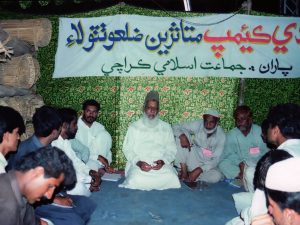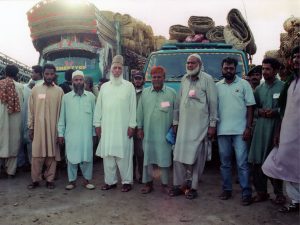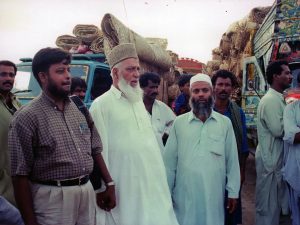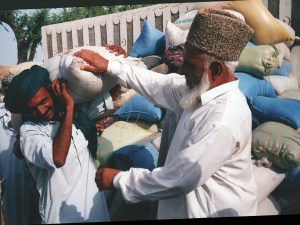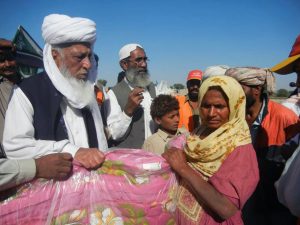PEOPLE OF KARACHI
AND THEIR EXEMPLARY PHILANTHROPY
Flood in Sindh
In 1994, Sindh witnessed torrential rains, which caused a flood-like situation in several districts. District Dadu was the worst affected. Crops in dozens of villages of Johi and Khairpur Nathan Shah, and homes were inundated. We sent several trucks of relief items from Karachi to distribute in the affected areas, as well as a team of doctors with a truck full of medicines. This team comprised of Dr. Zafar Iqbal, Dr. Aurangzeb, Dr. Zaki Sabri, Dr. Khalid, and Dr. Faiyaz, accompanied by naib qayyim Sindh Mumtaz Sahito. They used boats to reach out to those stranded in water; ration was distributed among thousands of families, hundreds of patients were given treatment, and free-of-cost medicines were supplied to them. We were provided these millions of rupees worth medicines, free of cost by Nabi Qasim and Indus Pharma.
Earthquake in Balochistan
On March 1, 1997, during a meeting of JI Karachi workers, we received the news of earthquake in Balochistan’s Harnai district. Informing the participants about it, I suggested that we dispatch a team of volunteering JI members to the area. I also asked for relief items and donation to be gathered. A large number of people wished to be a part of the relief team, and Abdul Rasheed Baig sahib was made the in-charge of the team. Before we began our journey, we saw newspapers reports about the arrival of about 5,000 tents from abroad, while 1,500 tents to be provided by governor Balochistan. But people privy to the development revealed that only a few dozen tents were distributed in the five villages of the Harnai sub-division. Some sources even said that the tents were also distributed in the areas which were not affected by the calamity.
Also, Speaker Balochistan Assembly had a good number of tents and relief items distributed in his two electoral constituencies in Sibi. What’s ironic is that the provincial government began Sibi mela on March 2, a day after the calamity struck the area. On one hand, millions were being spent every day on the five-day event to organize singing and dancing events, while on the other, bodies were lying in the open in the neighboring villages, waiting to be buried. The people of the area took a sigh of relief when JI Karachi workers arrived there; no political or ethnic group, or NGO had made it to the area prior to us.
Our team comprising Abdul Haq Hashmi, qayyim of the province, Qazi Muhammad Ismail, Quetta ameer, and Fazal Elahi met the governor to apprise him about the damages and aid in relief efforts. We also addressed a presser at the Quetta Press Club, and informed media persons about the efforts to overcome the damages caused by the quake. JI held another presser in Karachi on March 11 and appealed people to donate more to the fund. This generated a massive response, with hundreds of thousands of rupees and a pile of relief items received within days. We were also able to distribute a lot of relief items received from Jamiat Qatar-ul-Khairia and Islamic Relief Worldwide. JI’s women wing, too worked on the frontline to ensure relief to people. Sister Nasira Ilyas was the one to gather hundreds of thousands of rupees for ration.
The campaign included a large number of volunteers from Islami Jamiat-e-Talaba and Jamiat-e-Talaba Arabia. Ameer JI Balochistan Maulana Abdul Haq Baloch remained in the relief camp for March 6 to March 12 and supervised the distribution work. Besides naib ameer Maulana Muhammad Shah Mengal and qayyim Abdul Haq Hashmi, Quetta’s Maulana Hashim and Abdullah Hashim, Loralai’s Asadullah Khan and Muhammad Anwar Khan, Bahauddin and Master Ameer Muhammad Shah of Taaks, and Noor Muhammad Shah of Harnai were with us every step of the way. There was no organized network of JI in the area at the time; some of the people became close to the party after seeing our relief efforts, which led to the formation of the chapter in the following days.
Flood in Balochistan
It was the initial days of March, 1998 when torrential rains wreak havoc in different areas of Makran division. The intermittent 36-hour rain triggered floods, washing away hundreds of homes and livestock of some 70 villages. Several protective embankments were also damaged and more than 300 people went missing. We appealed the affluent for an urgent monetary aid. On this occasion, too, the women wing was at the forefront of the effort, and they managed to gather a large number of relief items from various sources. I convened a meeting of the district heads to send a team to the area, and tasked different people with determining rates of relief items in the market and making the purchase. We also advertised an appeal in the newspapers, asking for aid for the flood affectees, and dispatched some relief trucks to the areas on emergent basis.
A medical team comprising Dr. Muhammad Khalid and Dr. Sultan Mustafa left for Turbat on March 6. There, they provided medical treatment to nearly 3,500 people in the areas of Mariabad, Koshkalat, Dihat, Rikani, Panj Mardan, Zagrani Dan, Tanzag, Malikabad, Balan, Kasar, Kamra Pirani, and Harani. I also reached Turbat with a team of party’s workers and a large number of relief items. We were working on a plan to distribute the goods when it intensely started raining again, closing the roads leading to the areas. I somehow reached Karachi to arrange more items to be sent there. Suddenly, I remembered that Pakistan Airforce has C-130 planes, and decided to seek their support for the cause. I thought it was appropriate to talk to Qazi Hussain Ahmad sahib about this. I called him and requested that he talk to Nawaz Sharif for providing the aircraft. Those days, Qazi sahib was displeased with Nawaz Sharif over something, so he said. “I won’t call him myself. But there’s a possibility; instead of writing to him in a personal capacity, I can do so as the JI chief.”
The next day, an open letter was published in various newspapers. We were expecting a response soon and that’s what happened. I was in Idara noor-e-haq taking care of routine issues when some uniformed officers of PAF came and after exchanging greetings, asked me about the relief items. The items, gathered with the immense efforts of the workers and the women wing, were placed in Idara and Korangi. I pointed it out to them. Satisfied, they left. I then left for Gwadar. The next day, personnel of the force arrived at both the places with trucks. They loaded the items in no time, and soon there was no room for more. They took the goods to Faisal Airbase and loaded them into the C-130 aircraft, which then left for Turbat.
But a controversy erupted at the distribution phase. The personnel were adamant that they will be the ones to distribute it as they had picked and loaded it in the aircraft. It was awkward. I finally spoke to a commander and explained everything to him, and so the items were handed over to us. The officers and men of the force were impressed with the transparency in how we operated. The rest of the items in Karachi were dispatched to Turbat through a second flight. We didn’t have to spend a rupee on the transportation. Abdul Rasheed Baig was on the ground with 50 workers from Karachi to ensure the distribution of relief items. There were no elected representatives of the area there, while the administration’s performance was also dissatisfactory. We decide to call a meeting of the local and Karachi workers every day after the Isha prayers, to be briefed by the respective nazim regarding the daily performance of the teams.
The women wing was equally busy in the distribution. The team comprising Amtul Raqeeb sahiba, Talat Zaheer sahiba, Kiran Arif sahiba, and other women was constantly active in the affected areas. The extraordinary and large-scale relief efforts of the workers opened the door for JI’s dawah in the areas. The local people would come and meet the works and inquire about the objective and activities of the party. Some of the youth, who were inspired by the voluntary work, went on to become volunteers themselves. As they would help us with the distribution, they would curse their political representatives and the administration.
Cyclone in Thatta and Badin
In May 1999, the storm wreak havoc in the coastal areas of Thatta and Badin, i.e. Keti Bandar, Jati, Shah Bandar, and hundreds of villages of Golarchi. The 26-hour intermittent rains completely dismantled the power and telecommunication systems in the areas. Some 200 boats went missing along with the fishermen. Dr. Muhammad Khalid and Dr. Faiyaz, went to the far-flung areas of Keti Bandar in a small boat provided by the navy, and returned the next day.The next was a meeting with the Al-Khidmat officials, and an appeal for the relief of those affected by the storm. On a short notice, all districts of Karachi put up camps in the entirety of the city to gather relief items. Allah has blessed the residents of the city with an immense passion to give; people belonging to every school of thought donated generously in cash and material, bringing about a huge pile of ration and other relief items. We decided to set up relief items in Keti Bandar and Jati from May 25. The JI provincial chief, Asadullah Bhutto directed that camps also be set up in Golarchi and Badin. Naib qayyim Sindh Mumtaz Hussain Sahito was tasked with monitoring the relief operation at these camps. A 15-member convoy led by Dr. Faiyaz Alam left Karachi to set up a camp in Keti Bandar, and monitor the relief efforts. A camp was set up beside a road the same day.
The area didn’t have a nazm-e-jamaat at the time, so it was decided to seek the help of the locals and navy personnel to survey the damages before proceeding with the distribution. Later, some 5,124 people of 38 villages were distributed 7,500 kilos of flour, 3,000 kilos of rice, 1,400 kilos each of dal mong (pulse) and chana (gram), and 700 kilos of dried milk. A 55-member team led by Abdul Rashed Baig was dispatched from Karachi to Jati. In the absence of an appropriate place there too, the camp had to be set up on a roadside. The relief items, sent from Karachi via several trucks, were distributed among 35,858 people from the 6,006 families of 240 villages. Our doctors used the boats to reach out to those hit by the disease outbreak, and treated 980 people of 80 villages.
Dr. Khalid Mushtaq, in-charge of the Jati medical camp, went to the far-flung villages with his team, and treated the patients. Looking at Al-Khidmat’s relief work, many affluent people visiting the affected areas would simply hand over relief items at the organization’s camps. An Islamabad-based NGO sought our help and shared the details of the distribution among each of the families. Acting on their request, the items were bought and packed in Karachi, and then loaded onto six big trucks and sent to the affected areas. Al-Khidmat offices in Karachi and the districts worked late at night as manager Nasrullah Sheikh and his team worked tirelessly. Meanwhile, Mumtaz Sahito monitored the distribution, which enabled the provision of relief items to thousands of affectees of dozens of villages. In February 2000, more than 100 people in the Aranji tehsil of Balochistan’s Khuzdar district lost their lives to drought.
A youth with the name of Naveed Baloch, wrote to us to inform us about the gravity of the situation. The provincial nazm endorsed the details, and asked for assistance. I discussed the emerging situation with Secretary Al-Khidmat Syed Hafeezullah and Abdul Rasheed Baig, and sent a three-member delegation led by Abdul Haleem Baloch to review the situation. Once again, the people of Karachi donated generously in response to the appeal for help. The women wing was equally active in the campaign. Abdul Rasheed Baig left for Aranji with nine JI workers. In Wadh, he met Abdul Haleem Baloch, Muhammad Hashim Mengal, and Ali Akbar, qayyim of the Khuzdar district. They decided to set up the central relief camp in Wadh, and arrange ration and other relief items from the Khuzdar bazaar. Tehsil Aranji is a vast area of district Khuzdar. It borders with district Dadu on one side, and with district Lasbela on the other. Some two to three routes, ranging from 10 to 90 kilometers, led to the villages of Aranji from Wadh.
The routes ran through mountains, so they were uneven; only a four-wheel Datsun or large-tire trucks could take one to the Aranji mosque. Two teams were subsequently formed for the distribution of relief items. One of them comprised Abdul Rasheed Baig (head), Maulana Hashim Mengal from Wadh, and Abdul Sattar Gachki belonging to Khuzdar. This team visited Khori and other adjoining areas housing some 22 villages. There were also areas unfit for vehicles, and that’s where the most losses had taken place. During the journey, members of the team would also inquire relevant people about the deaths. They found out that the areas where the commute is only via camels and mules, had experienced 127 deaths.
The second team, led by, Abdul Haleem Baloch, was sent towards the Aranji mosque. They were scheduled to return that night after surveying the villages on the way, but the roads were so dilapidated that they were only able to return next afternoon. After reviewing the situation, two sub-camps were set up; one in Khori supervised by Abdul Sattar Gachki, while the other near Aranji masjid monitored by Abdul Haleem Baloch. Some 2,778 affectees were provided relief from the former camp, while 3,765 were given support from the latter. While we were blessed with the opportunity to carry out full-fledged relief activities in the areas hit by natural calamities and other tragedies, we witnessed that, unlike cities, there is no one that the people of underdeveloped rural areas can turn to for help. Once they make it to the assemblies, the elected representatives never give a thought about the people of the areas. They use their position and tall promises to get votes, and think of the masses as lesser beings.
|
|
![]()
